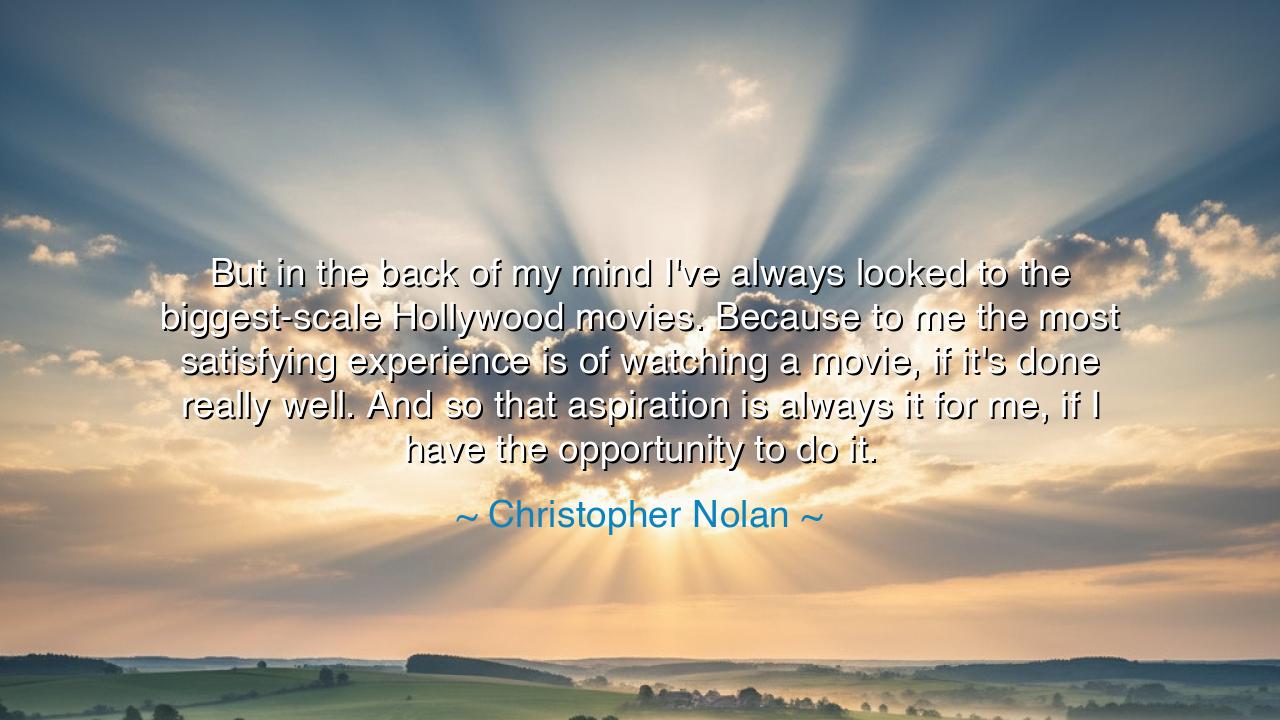
But in the back of my mind I've always looked to the
But in the back of my mind I've always looked to the biggest-scale Hollywood movies. Because to me the most satisfying experience is of watching a movie, if it's done really well. And so that aspiration is always it for me, if I have the opportunity to do it.






In the ancient world, there were those whose vision transcended the ordinary, whose ambition drove them to seek greatness not in the mundane, but in the grandiose. Christopher Nolan, in his reflection, “But in the back of my mind I’ve always looked to the biggest-scale Hollywood movies. Because to me, the most satisfying experience is of watching a movie, if it’s done really well. And so that aspiration is always it for me, if I have the opportunity to do it,” speaks of a desire that has echoed throughout history: the aspiration to create something monumental, to offer the world an experience of such immensity and beauty that it stirs the deepest emotions of those who witness it. Nolan’s words capture a universal truth: that the most satisfying accomplishments are those that require us to reach beyond what we thought possible.
The desire for greatness is not a new phenomenon. In ancient Greece, Homer spoke of heroes like Achilles, whose ambition and prowess on the battlefield sought not only personal glory but an eternal place in the annals of history. The Iliad and Odyssey are tales of larger-than-life characters who sought to define their legacy through immense deeds. Just as these epic heroes strove to reach the highest peaks of human endeavor, so too do artists like Nolan set their sights on creating works of extraordinary scale. The heroes of old understood that true greatness requires not just skill or talent but an enduring vision, one that pushes the boundaries of what is perceived as possible and offers something far more profound to those who experience it.
In the same vein, consider the builders of the Great Pyramids of Egypt. The pharaohs who commissioned these monuments were not satisfied with the ordinary or the transient. They sought to create something so grand, so enduring, that it would stand as a testament to their power and legacy for millennia to come. This kind of ambition is what Nolan speaks to in his own craft—the desire to create not just films, but experiences that resonate on a profound scale, films that leave an imprint on the soul of the viewer. In his pursuit, Nolan echoes the ancient builders who understood that to inspire, to move an audience, requires more than just technical expertise—it requires a vision that can capture the imagination and transport people to another world.
Yet, this ambition for greatness often comes with its own set of challenges. The Roman emperor Hadrian, who oversaw the construction of the Pantheon—one of the most remarkable architectural feats of the ancient world—knew that creating something of monumental scale required not just resources, but an unwavering belief in the vision of the project. The construction of such a building demanded discipline, innovation, and commitment. In a similar way, Nolan’s journey to create films that challenge the very notion of cinematic storytelling requires him to push not only his own creative limits but the boundaries of what is technically possible in filmmaking. The process of creation is filled with obstacles, yet it is through overcoming these that true artistic vision is realized.
The lesson embedded in Nolan’s words is a reminder to aim high in all that we do. Greatness does not come to those who seek mediocrity; it comes to those who dare to dream on the largest scale, to pursue endeavors that inspire, challenge, and awe. Just as Achilles sought glory on the battlefield, just as the pharaohs built monuments to their legacy, so too must we approach our own ambitions with a vision that is bold and far-reaching. It is not enough to create; one must create with the intent to leave a lasting mark, to produce work that will not fade with time but resonate throughout the ages.
In our own lives, the question we must ask is this: what are the grand goals we are striving toward? Are we content with the ordinary, or are we willing to dedicate ourselves to something that requires sacrifice, vision, and resilience? As Nolan suggests, the most satisfying experiences in life come not from the comfort of the known, but from the pursuit of the extraordinary. We must be willing to take risks, to venture into unfamiliar territory, and to pour our hearts into endeavors that challenge the very boundaries of possibility.
Let us, then, take inspiration from Nolan’s words and seek to create with purpose, to pursue greatness in all its forms, and to remind ourselves that the true joy of creation comes not from simply meeting expectations, but from exceeding them, from reaching heights that others may think impossible, and from creating works that leave a legacy, just as the heroes of old have left us their stories to guide us today. Through this pursuit, we find not only success but meaning—something far deeper than we could have imagined when we first began our journey.






AAdministratorAdministrator
Welcome, honored guests. Please leave a comment, we will respond soon